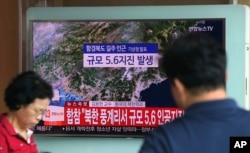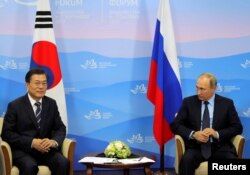Asked whether he will take military action against North Korea, U.S. President Donald Trump, said Wednesday “we will see what happens. Certainly, that is not the first choice.”
Trump spoke at the White House following a telephone call with China’s president, Xi Jinping.
Asked by VOA what he discussed concerning North Korea with the Chinese leader, Trump replied that “President Xi would like to do something on North Korea” but it is unclear “whether or not he can do it.”
Trump described his conversation with Xi as “very, very frank and very strong,” saying it “was a very good phone call. It lasted a long time.”
The president added that on the recent provocations by North Korea, Xi “agrees with me 100 percent. He does not want to see what is happening there either.”
Trump and Xi “committed to strengthen coordination and take further action with the goal of achieving the denuclearization of the Korean Peninsula,” according to a readout of the phone call issued by the White House.
Later aboard Air Force One, Trump told reporters that Xi is “very much in favor of the de-nuke of North Korea” and that “we’re going to be talking again soon.”
The Chinese president told Trump there should be a peaceful settlement of the issue, adding that dialogue combined with a set of comprehensive measures is best for seeking a long-term solution, according to the Xinhua news agency.
In the past few days Trump has spoken with counterparts in Japan, South Korea, Australia and the United Kingdom, telling them opening discussions with North Korea is currently not the best option to address the country's growing nuclear weapons program, according to White House officials.
A flurry of conversations among regional and world leaders about North Korea has been prompted by Pyongyang exploding what it says, and several international experts concur, was a hydrogen bomb at its Punggye-ri nuclear test site on Sunday. North Korean officials blame Washington for the test, asserting it was necessary to “eradicate the hostile moves and nuclear threats of the U.S. going on for decades.”
South Korea is planning to deploy additional launchers of a controversial U.S.-built missile defense system, a further sign of escalating tensions and a diplomatic stalemate over North Korea's growing nuclear weapons program.
Additional THAAD launchers
The Defense Ministry announced Wednesday four more rocket launchers that make up the Terminal High-Altitude Area Defense (THAAD) system will be installed along with the two launchers already in operation at a former golf course in the city of Seongju.
China and Russia oppose the deployment of the THAAD system in South Korea. They view the powerful radar-based system as a threat.
The news also prompted a demonstration by about 400 residents near the Seongju base, about 300 kilometers south of Seoul. Police clashed with the protesters, injuring some of the residents, according to South Korean news reports.
The announcement came as U.S. Defense Secretary Jim Mattis told his South Korean counterpart, Song Young-moo that Washington remains "ironclad" in its commitment to defend South Korea.
Mattis promised a "massive, effective, and overwhelming military response" if South Korea and other U.S. allies are threatened, according to the Defense Department.
Along with bolstering its military, President Moon explored a diplomatic solution to the standoff Wednesday during talks with Russian President Vladimir Putin on the sidelines of an economic summit in Vladivostok. Both leaders agreed North Korea must end its nuclear and missile testing programs. But Putin once again rejected imposing further sanctions on the isolated regime, maintaining that negotiations are the only means to resolve the issue.
Moon urged Putin to consider blocking oil shipments to the North, as well as preventing North Koreans from working in other countries.
China also contends that further tightening sanctions against Pyongyang will do little to ease tensions on the Korean peninsula.
The United States this week is circulating a draft of a new resolution about North Korea at the United Nations, hoping for a Security Council vote next Monday.
Trump has vowed to stop all U.S. trade with any country doing business with North Korea, and Treasury Secretary Steven Mnuchin says he is working on details of such a plan, which would primarily target China. More than 90 percent of North Korea’s export earnings come from China.










